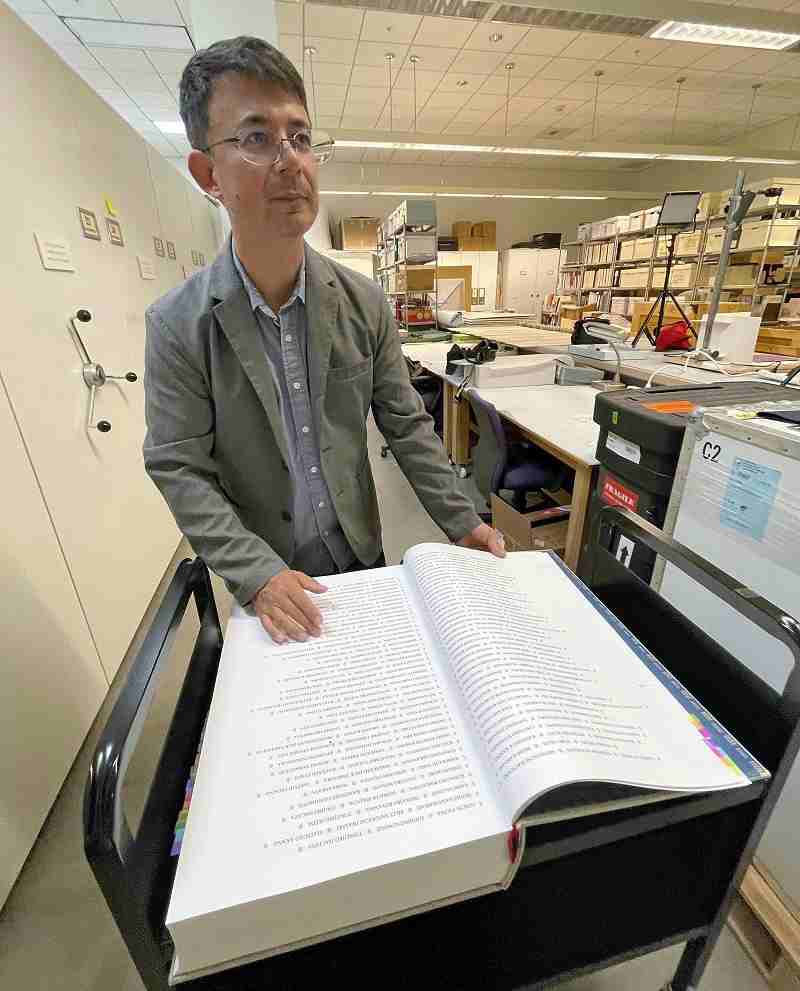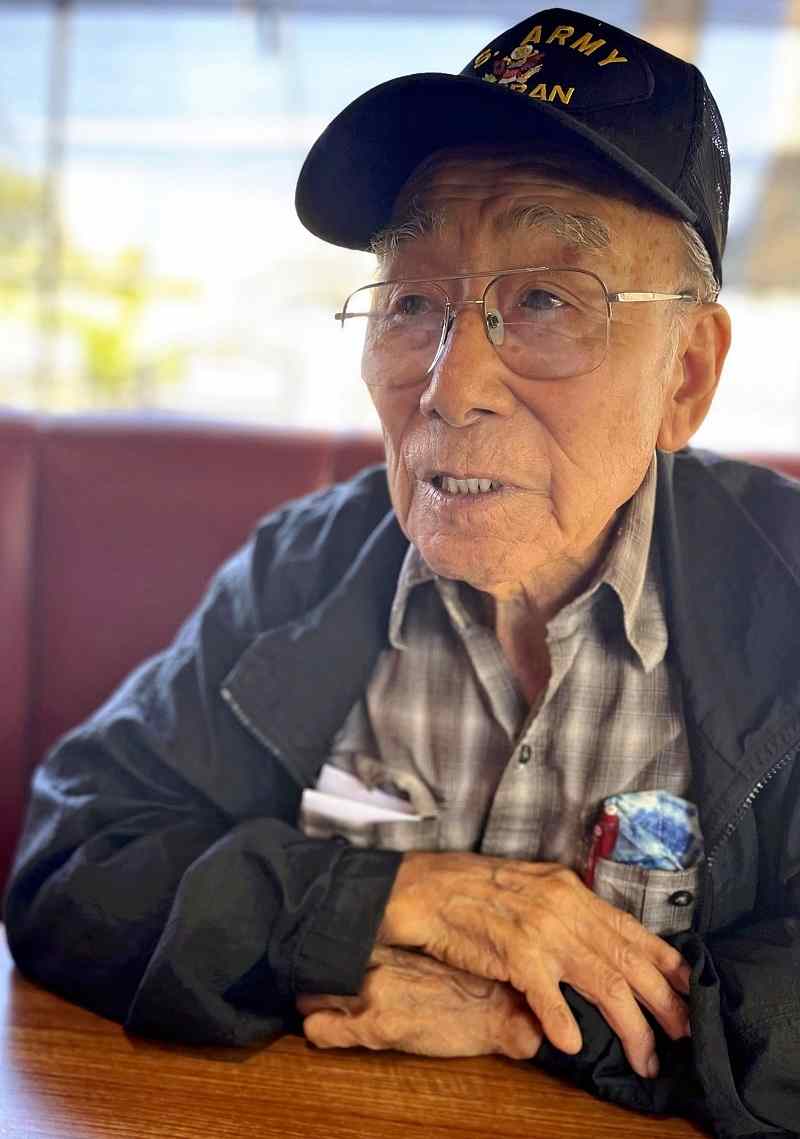
University of Southern California Prof. Duncan Williams talks about the wartime incarceration of Japanese Americans as he stands in front of “Ireicho,” at the Japanese American National Museum in Los Angeles on Sept. 26.
11:23 JST, November 4, 2022
LOS ANGELES — A comprehensive listing of the 125,284 Japanese Americans incarcerated in the United States during the Pacific War has recently been completed.
The about 1,200-page book, titled “Ireicho,” meaning “a sacred book of names as a monument,” was compiled by a 12-member team headed by Duncan Williams, a professor at the University of Southern California.
Williams, 53, stresses that the incarceration of Japanese Americans was not merely a matter of numbers, and that he was driven by a strong desire to make it clear that over 120,000 detainees actually existed. By recording each individual’s name, it underscores the point that each person had a life of their own, he says.
Williams’ team worked to collect the names of people who were confined in 10 incarceration camps on the U.S. mainland, as well as facilities belonging to the U.S. Justice Department, the military, and other organizations, covering a total of 75 sites. The project began in mid-2019 and took about three years to complete.
The team spent a great deal of time cross-checking detainees’ names because the lists were prepared by Americans who were unfamiliar with Japanese names and thus contained many errors and omissions. The team repeatedly checked the names against birth certificates, census records and other old documents.
Errors in or the omission of names could compromise people’s honor and sense of justice, Williams says.

Bacon Sakatani, pictured here in Los Angeles on Oct. 4, speaks about the time he spent in an incarceration camp during the Pacific War.
Incarceration
In February 1942, following the outbreak of war between the United States and Japan, then U.S. President Franklin Roosevelt signed an executive order authorizing the forced removal of Japanese Americans from certain areas.
Japanese Americans living in the United States, mainly on the West Coast and in Hawaii, were forcibly relocated to incarceration camps in depopulated areas, and as a result, many of them lost their jobs and property. The move was driven by prejudice and discrimination against Japanese Americans.
In 1988, the U.S. government officially apologized and announced the payment of compensation.
‘Most difficult period’
This year marks 80 years since Japanese Americans began being rounded up. Survivors are aging and their number decreases each year.
Bacon Sakatani, a 93-year-old second-generation Japanese American living in California, had just turned 13 when he and six other family members were sent from California to the Heart Mountain camp in Wyoming in August 1942.
His father, a vegetable farmer, had just bought a new tractor. His family owned a piano, and his younger sister took lessons once a week. However, because of the incarceration they lost everything.
The Sakatani family spent about three years in the camp until their release in 1945. Many children in the camp were around his age, so he had no trouble finding others to play with. His parents eventually became resigned to their situation and with life in the camp. Likewise, he was not disheartened by the incarceration, he recalls.
Rather, it was when the family was released that they began to truly suffer. With nowhere to go, they headed to a potato farm in Idaho. However, when the harvest was over and jobs disappeared, they returned to California six months later.
Sakatani’s father rented fallow land from a landowner and began farming again. Initially, they had no house and had to live in a tent for a while. Sakatani describes that time as the most difficult period of his life, saying no matter how hard he tries, he can never erase it from his memory.
Name-checking system
“Ireicho” can be seen at the Japanese American National Museum in Los Angeles. The names listed in the book can be viewed by detainees and family members who are allowed to confirm that details are correct by stamping the relevant listing with a special blue seal. They can also rectify errors or omissions. The system is aimed at updating the historical record.
Last month, Sakatani stamped the seal on his father’s name. Of the seven members of his family, four, including his parents, have already passed away.
Sakatani says it is significant that the names have been compiled into a single book, adding that, as people’s memories of the incarceration fade, the book will help people remember the racial discrimination that Japanese Americans suffered in the past.
The list can also be viewed online at https://ireizo.com/
Top Articles in World
-

Israeli Ambassador to Japan Speaks about Japan’s Role in the Reconstruction of Gaza
-

Videos Plagiarized, Reposted with False Subtitles Claiming ‘Ryukyu Belongs to China’; Anti-China False Information Also Posted in Japan
-

North Korea Possibly Launches Ballistic Missile
-

Chinese Embassy in Japan Reiterates Call for Chinese People to Refrain from Traveling to Japan; Call Comes in Wake of ¥400 Mil. Robbery
-

Pentagon Foresees ‘More Limited’ Role in Deterring North Korea
JN ACCESS RANKING
-

Japan PM Takaichi’s Cabinet Resigns en Masse
-

Japan Institute to Use Domestic Commercial Optical Lattice Clock to Set Japan Standard Time
-

Israeli Ambassador to Japan Speaks about Japan’s Role in the Reconstruction of Gaza
-

Man Infected with Measles Reportedly Dined at Restaurant in Tokyo Station
-

Man Infected with Measles May Have Come in Contact with Many People in Tokyo, Went to Store, Restaurant Around When Symptoms Emerged





















